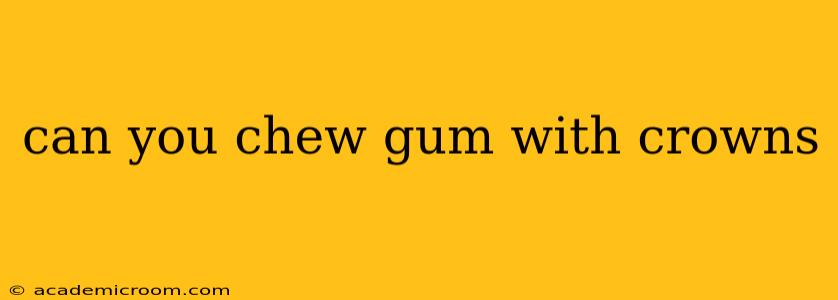Dental crowns are a fantastic solution for restoring damaged or decayed teeth, providing strength, protection, and an improved aesthetic appearance. However, the question many patients have is: can you chew gum with crowns? The short answer is: it depends. While generally not explicitly forbidden, chewing gum with crowns requires careful consideration and some caveats. Let's delve into the details.
What Are Dental Crowns?
Before we address the gum-chewing question, let's briefly review what dental crowns are. A crown is a tooth-shaped cap that's cemented onto a damaged tooth to restore its shape, size, strength, and appearance. They're often used after a root canal, to protect a weakened tooth, or to improve the cosmetics of a discolored or misshapen tooth. Crowns are made from various materials, including porcelain, ceramic, metal, or a combination thereof.
Can I Chew Gum With a Porcelain Crown?
Porcelain crowns are highly aesthetic and closely resemble natural teeth. However, while strong, they are not indestructible. Aggressive chewing, especially on hard or sticky substances like gum, can potentially damage the porcelain over time, leading to chipping or fracturing. Therefore, while occasional, gentle chewing might be acceptable, it's best to minimize or avoid it altogether.
Can I Chew Gum With a Metal Crown?
Metal crowns, typically made from gold or alloys, are generally more durable than porcelain crowns. They can withstand more force and are less prone to chipping or fracturing. However, even with metal crowns, excessive chewing or chewing on very hard gum can still put undue stress on the crown and the underlying tooth structure. This could potentially loosen the crown or even damage the supporting tooth.
What Happens if I Chew Gum With a Crown?
The consequences of chewing gum with a crown depend on several factors, including the type of crown, the force applied during chewing, and the composition of the gum itself. The most common issues include:
- Chipping or fracturing of the crown: This is especially true for porcelain crowns.
- Loosening of the crown: Excessive force can cause the cement holding the crown in place to weaken or fail.
- Damage to the underlying tooth: The force from chewing can be transferred to the underlying tooth, potentially leading to further damage or discomfort.
- Gum irritation: Some gums contain ingredients that can irritate the gums around the crown.
What Types of Gum Are Safest With Crowns?
If you insist on chewing gum with crowns, opt for sugar-free varieties and avoid extremely hard or sticky gums. The softer the gum, the less stress it will place on your crowns. Chewing should also be gentle and infrequent.
What are the Alternatives to Chewing Gum?
Consider healthier alternatives to chewing gum, such as:
- Drinking plenty of water: This aids in saliva production, which is crucial for oral health.
- Using sugar-free mints or breath strips: These offer a refreshing breath without the potential damage of gum chewing.
How Long Do Dental Crowns Last?
The lifespan of a dental crown varies depending on several factors, including the type of crown, oral hygiene practices, and chewing habits. With proper care, dental crowns can last for many years, sometimes even decades. However, consistently chewing gum aggressively can significantly reduce their lifespan.
Should I Tell My Dentist if I Chew Gum?
It's always best to be upfront with your dentist about your habits, including chewing gum. They can assess your specific situation, considering the type of crown you have and provide tailored advice.
In conclusion, while the occasional, gentle chewing of soft gum might not cause immediate problems for some individuals with crowns, it's generally recommended to minimize or avoid chewing gum entirely to protect your crowns and maintain their longevity. Consulting your dentist is crucial for personalized guidance based on your specific dental situation.
